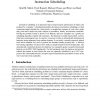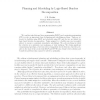93 search results - page 17 / 19 » Non-clairvoyant scheduling with precedence constraints |
HEURISTICS
2008
13 years 5 months ago
2008
Instruction scheduling is an important step for improving the performance of object code produced by a compiler. A fundamental problem that arises in instruction scheduling is to ...
JCSS
2007
13 years 5 months ago
2007
In distributed real-time systems, an application is often modeled as a set of real-time transactions, where each transaction is a chain of precedence-constrained tasks. Each task ...
IOR
2007
13 years 5 months ago
2007
We combine mixed integer linear programming (MILP) and constraint programming (CP) to solve an important class of planning and scheduling problems. Tasks are allocated to faciliti...
ICCAD
2003
IEEE
14 years 2 months ago
2003
IEEE
Abstract— Dynamic voltage scaling (DVS) is a powerful technique for reducing dynamic power consumption in a computing system. However, as technology feature size continues to sca...
IPCO
1998
13 years 6 months ago
1998
We provide several non-approximability results for deterministic scheduling problems whose objective is to minimize the total job completion time. Unless P = NP, none of the probl...


